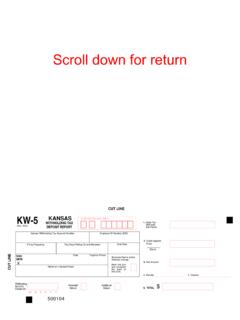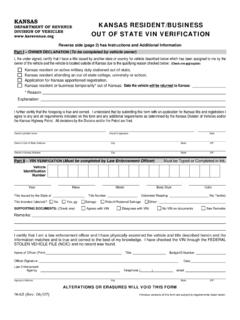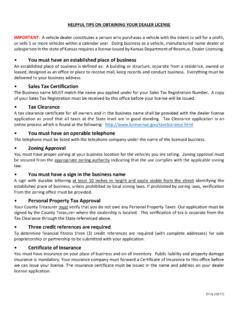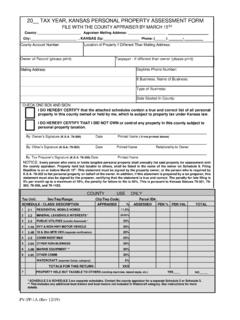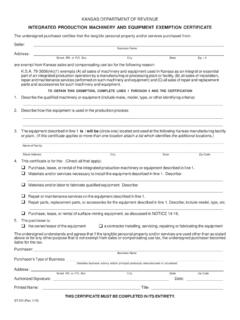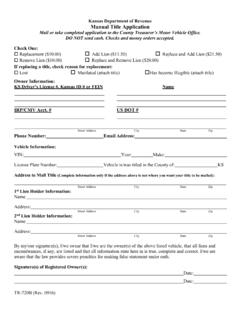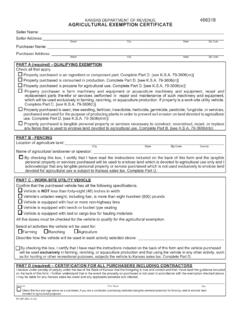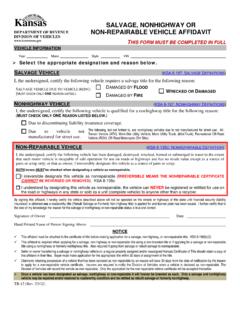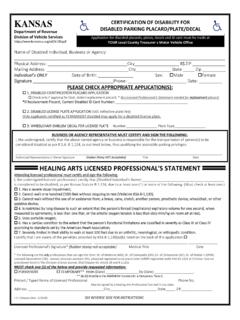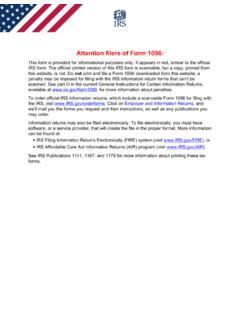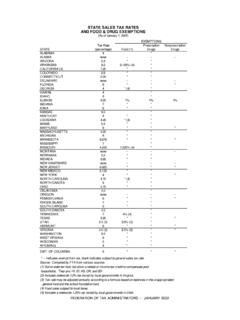Transcription of Withholding Tax Guide - Kansas Department of Revenue
1 KW-100(Rev. 6-21)WithholdingTax GuideNEW Withholding TAX RATESfor wages paid on or after January 1, there is a conflict between the law and information found in this publication, the law remains the final authority. Under no circumstances should the contents of this publication be used to set or sustain a technical legal position. A library of current policy information is also available on the Kansas Department of Revenue s website at: OF CONTENTSINTRODUCTION TO Kansas Withholding TAX ..3 Who Must Withhold Kansas Income Tax?Who are Employees/Payees?Sole Proprietors and PartnersPAYMENTS SUBJECT TO Kansas Withholding .. 3 WagesSupplemental WagesFringe BenefitsCafeteria, 401K, and Profit-Sharing PlansPayments Other Than WagesPensions, Annuities & Deferred IncomeInterest and DividendsLottery and Gambling WinningsWITHHOLDING REGISTRATION ..4 Who Must RegisterHow and When to RegisterYour Kansas Tax Account NumberYour Registration CertificateHOW TO WITHHOLD Kansas TAX.
2 5 Kansas Withholding Allowance CertificateAdditional Kansas WithholdingExclusion from Kansas WithholdingHow to Compute Kansas WithholdingSample Withholding ComputationsSPECIFIC Withholding SITUATIONS ..7 Kansas ResidentsNonresidents of KansasEmployees of Interstate CarriersEntertainers and AthletesGambling WinningsManagement and Consulting FeesNonresident AliensOther Miscellaneous PaymentsSupplemental WagesKANSAS CUSTOMER SERVICE CENTER ..8 File, Pay and Make Updates ElectronicallyWhat Can I Do ElectronicallyRequirements to File and PayPay by Credit CardWire TransfersRecord KeepingFiling Frequencies and Due DatesCompleting a KW-5 Deposit ReportCorrecting a KW-5 Deposit ReportANNUAL RETURNS AND FORMS ..12 Completing a Withholding Tax Return (KW-3)Wage and Tax Statements (W-2)Annual Information Returns (1099 and 1096)ADDITIONAL INFORMATION ..13 When Returns are LateEmployer/Payer and Officer LiabilityAbout Our Billing ProcessReporting Business ChangesChanging Your Filing FrequencyClosing Your Withholding AccountWhen in REQUIREMENTS AND RESOURCES.
3 15 Federal RequirementsKansas RequirementsBusiness Resource DirectoryFORM 17 FORM CR-108 ..18 TABLES FOR PERCENTAGE METHOD ..19 WAGE BRACKET TABLES ..21 TAXPAYER ASSISTANCE ..BACK COVER3 INTRODUCTION TO Kansas Withholding TAXK ansas has a state income tax on personal income. Kansas Withholding tax is the money that is required to be withheld from wages and other taxable payments to help prepay the Kansas income tax of the employer or payer pays no part of this tax, but is responsible for deducting it from wages or taxable payments made to an employee or payee. The employer or payer holds the tax in trust for the state, and then remits these funds to the Kansas Department of Revenue on a regular : Requirements for income tax Withholding generally apply to both employers and payers. Throughout this publication, we may use the term employer to denote either an employer or a payer, and the term employee to mean either an employee or MUST WITHHOLD Kansas INCOME TAXAs a general rule, every Kansas employer or payer who is required to withhold federal income tax according to the Internal Revenue Code must also withhold Kansas income law defines an employer as any person, firm, partnership, limited liability company, corporation, association, trust, fiduciary or any other organization: who qualifies as an employer for federal income taxwithholding purposes; who maintains an office, transacts business, or derives anyincome from sources within the state of Kansas (whetheror not the paying agency is in Kansas ); for whom an individual performs or performed services ofany nature as the employee of such employer.
4 And, who has control of the payment of wages for such servicesor is the officer, agent or employee of the person havingcontrol of the payment of professional employer organization (PEO) is considered to be an employer for the purpose of Withholding Kansas income tax from its assigned workers. A PEO is anyone engaged in providing, or representing itself as providing, the services of employees in accordance with one or more professional employer payer is any person or organization, other than an employer, who makes a payment other than wages, or a payment of a pension, annuity or deferred income that is taxable under the Kansas income tax act. Kansas income tax Withholding is required on payments other than wages (defined on page 4) that are made by payers to payees. Payers include trustees of pension funds and gambling : Even though the employer or payer itself may not be subject to Kansas income tax (such as governmental agencies or nonprofit religious, educational, or charitable institutions), the employer or payer is still required to withhold income tax from payments made to its employees or ARE EMPLOYEES/PAYEESEMPLOYEESFor Kansas Withholding tax purposes an employee is either: 1) a resident of Kansas performing services either inside oroutside of Kansas ; or, 2) a nonresident of Kansas performing services within the state of in other states are required to withhold Kansas income tax when the employee is a Kansas resident or when wages paid are for services performed in Kansas .
5 Although an individual may be allowed considerable discretion and freedom of action, that person is considered an employee as long as the employer has the legal right to control what will be done, how it will be done, and the result of the services performed. If you have questions about whether an individual performing services for you is your employee (you are responsible for the payroll taxes on the wages paid) or is an independent contractor (the individual is responsible for taxes on the income), contact the Internal Revenue Service (IRS) or the Kansas Department of Labor in determining how to classify a : Penalties may be imposed on persons who knowingly and intentionally mis-classify an employee as an independent contractor and fail to report state income tax Withholding or unemployment insurance payee is any person or organization who receives a payment other than wages, or payment of a pension, annuity or deferred income which is subject to Kansas Withholding .
6 Examples include: 1) Kansas residents receiving a taxable non-wage payment, or a taxable pension, annuity or other deferred income; and, 2) nonresident individuals or organizations receiving a management/consulting the Payments Subject to Kansas Withholding section that follows for the types of payments subject to Withholding tax. For examples of how to calculate Kansas Withholding on taxable payments, see pages 5 through PROPRIETORS and PARTNERSIf you are a sole proprietor or a partner in a partnership, you are not considered to be an employee of your business, and therefore will not withhold income tax on your compensation. Instead you will make quarterly estimated income tax payments to prepay your state income tax liability on taxable income. Visit our website ( ) for more information about these SUBJECT TO Kansas Withholding TAXAs a general rule, if federal income tax Withholding is required on the payment, Kansas Withholding is also required.
7 If federal Withholding is voluntary, Kansas Withholding is generally voluntary as are all payments, whether in cash or other form, paid by an employer to an employee for services performed. If the payment is a wage as defined by section 3401(a) of the federal internal Revenue code, it is subject to Kansas income tax Withholding when 1) the recipient is a resident of Kansas OR the services were performed in Kansas ; and, 2) the payment is subject to federal income tax Withholding . Exception: Wages paid to an individual who performs services as an extra in connection with any phase of a motion picture or television 4production or commercial for less than 14 days during any calendar year are not subject to Kansas Withholding tax. An extra is an individual who pantomimes in the background, adds atmosphere and performs such actions without WAGESS upplemental wages are compensation paid to an employee in addition to the employee s regular wage.
8 They include, but are not limited to, bonuses, commissions, overtime pay, accumulated sick leave, severance pay, and back Withholding is required on all supplemental wage payments. How you calculate the Kansas Withholding depends on how the payment is made; see page 8, Supplemental BENEFITSIn general, any fringe benefit that is included in an employee s gross income and subject to federal Withholding tax is also subject to Kansas Withholding tax. Fringe benefits include cars and flights on aircraft you provide, free or discounted commercial flights, vacations, discounts on goods or services, memberships in country clubs or other social clubs, and tickets to entertainment or sporting , 401K, and PROFIT SHARING PLANSK ansas law requires Withholding on wages. If your cafeteria, 401K, profit sharing, or other employee plan is considered to be wages by the federal government and federal income tax Withholding is required, Kansas Withholding is also OTHER THAN WAGESK ansas Withholding is required on these taxable payments other than wages when federal Withholding is required [ 79-3295].
9 Any determination by the IRS that relieves a payerfrom Withholding on these payments also will apply for Kansasincome tax Withholding purposes. Any supplemental unemployment compensation, annuityor sick pay Payments made pursuant to a voluntary withholdingagreement Gambling winnings Taxable payments of Indian casino profits Payments of any vehicle fringe benefitMANAGEMENT AND CONSULTING FEESK ansas requires Withholding on management and consulting fees paid in the ordinary course of a trade, business or other for profit venture to a nonresident of Kansas performing these services in Kansas ( , earning taxable Kansas source income). The requirement to withhold Kansas tax on these fees does not apply to individuals, governmental or nonprofit entities, since they are not for-profit ventures. See the sample calculation on page , ANNUITIES and OTHER DEFERRED INCOMEK ansas Withholding may also apply to pensions, annuities or deferred income paid to a Kansas resident.
10 To be subject to Withholding , the payment must be taxable under the Kansas income tax act and be: 1) periodic payments of pensions, annuities and other deferred income; or, 2) nonperiodic distributions of pensions, annuities and other deferred income; or, eligible rollover distributions of pensions, annuities and other deferred : Kansas Withholding is required only when federal Withholding is required. If federal Withholding is voluntary on these payments, Kansas Withholding is also : You are a payer of a taxable pension on which federal Withholding is not required; however, the Kansas resident payee elects to have federal Withholding deducted from that pension. Since the federal Withholding is voluntary, Kansas Withholding is also Withholding on deferred compensation plans follows federal Withholding rules. Contributions to a deferred compensation plan are generally not subject to Withholding . However, if federal Withholding is required on a taxable distribution from a deferred compensation plan, Kansas Withholding is also and DIVIDENDSF ederal law requires back-up Withholding on interest and dividend income in some situations.
